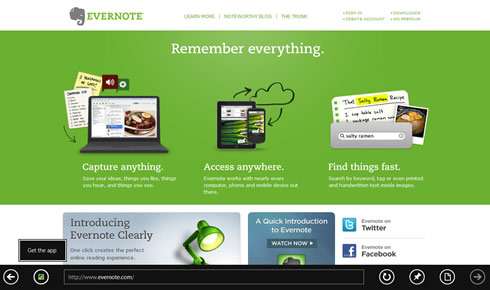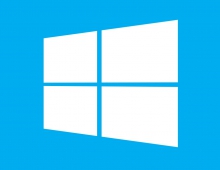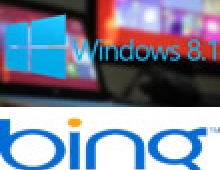
Windows Store Beta Coming In February
At a Windows Store preview event in San Francisco,
Microsoft announced the policies and business terms for
the Windows Store, which will be an integrated feature
in Windows 8 OS and the distribution point for Metro
style apps.
The company described the app certification policies and business terms for the Store, both of
which are now published to Microsoft's Dev Center. Microsoft also announced
its First Apps contest for developers, and invited a select set of developers to submit Metro style
apps for inclusion in the Beta version of the Store.
In an effort to attract developers, Microsoft will be offering an up to 80% revenue share for apps sold through its new platform.
Windows Store Details
Microsoft has designed the Windows Store for easy app discovery. The company used minimal chrome so apps shine through, and complemented the apps with a series of way-finding and promotion mechanisms - search, category browse, ranking lists, editorial curation - to help people find apps:

The landing page pushes compelling apps to the surface. Categories help organize the apps?the latest, most popular, and fast rising apps all have dedicated lists surfaced here. Personalized app recommendations and also topic pages that promote apps related to editorial themes will be also available.
The Store app catalog will be also indexed by search engines, such as Bing. The web search result will point to a web version of the app listing, which Microsoft publishes based on the same content provided for the Store app listing. For users who are running Windows 8, the page directs them to the Store. For other users, the page says the app is available on Windows 8.
Developers will be also able to promote apps from their websites, not just with "available in the Windows Store" logos, but with built-in promotion through Internet Explorer 10. With a line of markup, a website will be able to promote an app via the app button within the browser, visible to anyone running Internet Explorer 10 on Windows 8. The app button on a Windows 8 PC takes users to the app listing in the Store or directly to the app, if it's installed.

These design choices mean minimal distance between the user and the app listing, which is a developer's promotional canvas. Below, you can see that ZeptoLab, the developers of the popular game Cut the Rope, can take full advantage of the design of the app listing page to show off the Cut the Rope app that they've developed for Windows 8:

The Windows Store will offer free and paid apps in 231 markets worldwide. Microsoft will offer a number of market-specific catalogs, tailored for those customers, and a "rest of world" (ROW) catalog for all other markets. Developers will be able to choose the catalogs in which their app is listed.
Apps listed in the Store will be visible to all Windows 8 users, so enterprise apps can be offered in the Store, just like any other Metro style app. However, Microsoft will also offer support for enterprises that want direct control over the deployment of Metro style apps.
Enterprises will be able to choose to limit access to the Windows Store catalog by their employees, or allow access but restrict certain apps. In addition, enterprises will be able to choose to deploy Metro style apps directly to PCs, without going through the Store infrastructure. For Windows 8 Beta, IT administrators can use group policy to permit Metro style app installations, as long as the apps are signed by trusted publishers and the machines are joined to the domain. Then the IT admin can use powershell commandlets to manage those Metro-style apps on Windows 8.
Microsoft will also offer full platform support for free apps, trials (both time-based and feature-based trials) and paid apps, including in-app purchase. Sales sales analytics will also help developers target their customers more effectively.
That said, developers will be also able to choose to manage their customer transactions directly, for example, with newspaper subscriptions, or to adopt a business model with offline fulfillment, such as for auctions. Microsoft does not mandate a specific transaction engine and developers can use their own. They can also choose the ad control that works best for them.
Lots of apps already have business models that depend on a particular transaction provider or that benefit from ties to other lines of business. Developers who want to use their own transaction platforms for in-app purchases will be able to do so with the Windows Store.
Microsoft will also allow choice in ad controls, as many developers take advantage of advertising as a way to fund their businesses. With the Windows Store, developers will be able to choose to use whatever ad platform they prefer, whether it?s from Microsoft or someone else.
Microsoft is providing every developer with the technical certification assessments - the App Certification Kit - as part of the SDK, as well as an app acceptance guidance, in plain language, in its app certification policies. The App Certification Kit and the SDK are included in the Windows 8 Developer Preview.
Regarding the economics of the Store, Microsoft's individual registration fee will be $49 USD ($99 USD for companies). The company will also will share up to 80% of the revenue generated from app sales. The revenue share base is 70% - just like Apple's store - but when an app achieves $25k USD in revenue - aggregated across all sales in every market?that app moves to 80% revenue share for the lifetime of that app.
The Windows Store will be available when Windows 8 Beta is released.
Microsoft added that all apps during the Beta period will be free apps.
In an effort to attract developers, Microsoft will be offering an up to 80% revenue share for apps sold through its new platform.
Windows Store Details
Microsoft has designed the Windows Store for easy app discovery. The company used minimal chrome so apps shine through, and complemented the apps with a series of way-finding and promotion mechanisms - search, category browse, ranking lists, editorial curation - to help people find apps:

The landing page pushes compelling apps to the surface. Categories help organize the apps?the latest, most popular, and fast rising apps all have dedicated lists surfaced here. Personalized app recommendations and also topic pages that promote apps related to editorial themes will be also available.
The Store app catalog will be also indexed by search engines, such as Bing. The web search result will point to a web version of the app listing, which Microsoft publishes based on the same content provided for the Store app listing. For users who are running Windows 8, the page directs them to the Store. For other users, the page says the app is available on Windows 8.
Developers will be also able to promote apps from their websites, not just with "available in the Windows Store" logos, but with built-in promotion through Internet Explorer 10. With a line of markup, a website will be able to promote an app via the app button within the browser, visible to anyone running Internet Explorer 10 on Windows 8. The app button on a Windows 8 PC takes users to the app listing in the Store or directly to the app, if it's installed.

These design choices mean minimal distance between the user and the app listing, which is a developer's promotional canvas. Below, you can see that ZeptoLab, the developers of the popular game Cut the Rope, can take full advantage of the design of the app listing page to show off the Cut the Rope app that they've developed for Windows 8:

The Windows Store will offer free and paid apps in 231 markets worldwide. Microsoft will offer a number of market-specific catalogs, tailored for those customers, and a "rest of world" (ROW) catalog for all other markets. Developers will be able to choose the catalogs in which their app is listed.
Apps listed in the Store will be visible to all Windows 8 users, so enterprise apps can be offered in the Store, just like any other Metro style app. However, Microsoft will also offer support for enterprises that want direct control over the deployment of Metro style apps.
Enterprises will be able to choose to limit access to the Windows Store catalog by their employees, or allow access but restrict certain apps. In addition, enterprises will be able to choose to deploy Metro style apps directly to PCs, without going through the Store infrastructure. For Windows 8 Beta, IT administrators can use group policy to permit Metro style app installations, as long as the apps are signed by trusted publishers and the machines are joined to the domain. Then the IT admin can use powershell commandlets to manage those Metro-style apps on Windows 8.
Microsoft will also offer full platform support for free apps, trials (both time-based and feature-based trials) and paid apps, including in-app purchase. Sales sales analytics will also help developers target their customers more effectively.
That said, developers will be also able to choose to manage their customer transactions directly, for example, with newspaper subscriptions, or to adopt a business model with offline fulfillment, such as for auctions. Microsoft does not mandate a specific transaction engine and developers can use their own. They can also choose the ad control that works best for them.
Lots of apps already have business models that depend on a particular transaction provider or that benefit from ties to other lines of business. Developers who want to use their own transaction platforms for in-app purchases will be able to do so with the Windows Store.
Microsoft will also allow choice in ad controls, as many developers take advantage of advertising as a way to fund their businesses. With the Windows Store, developers will be able to choose to use whatever ad platform they prefer, whether it?s from Microsoft or someone else.
Microsoft is providing every developer with the technical certification assessments - the App Certification Kit - as part of the SDK, as well as an app acceptance guidance, in plain language, in its app certification policies. The App Certification Kit and the SDK are included in the Windows 8 Developer Preview.
Regarding the economics of the Store, Microsoft's individual registration fee will be $49 USD ($99 USD for companies). The company will also will share up to 80% of the revenue generated from app sales. The revenue share base is 70% - just like Apple's store - but when an app achieves $25k USD in revenue - aggregated across all sales in every market?that app moves to 80% revenue share for the lifetime of that app.
The Windows Store will be available when Windows 8 Beta is released.
Microsoft added that all apps during the Beta period will be free apps.



















